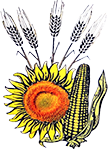Testing Some Winter Wheat Varieties and Lines of for Seed Production, Cultivated in an Ecologycal System at ARDS Valu lui Traian
Violeta Maria Simionescu1, Monica Tanc2, Ion Bulică2
1Universitatea Ovidius din Constanţa
2Stațiunea de Cercetare-Dezvoltare Agricolă Valu lui Traian
Keywords: wheat varieties, organic agriculture, yields.
Abstract: The Common Agricultural Policy (CAP) for 2023-2027 will be fairer, greener and more performance-based, so as to ensure a sustainable future for European farmers, provide better targeted support for smaller farms and enable greater flexibility for Member States to adapt measures to local conditions.
The EU budget for the Common Agricultural Policy (CAP) accounts for about a third of the total. The purpose of allocating this budget is to:
- ensure that EU citizens are provided with safe and affordable food;
- guarantee a fair standard of living for farmers;
- conserve natural resources and respect the environment.
An important part of this budget will be directed to the increase of the cultivated areas in ecological system, a system through which the natural resources are conserved and through which the environment is respected.
Stimulating the continuous and fast-growing growth of the organically cultivated area with cereals, grain legumes, oilseeds and technical, fodder, aromatic and medicinal plants through the CAP requires the production of quality seeds and in the necessary quantity constant assurance of biological material for the establishment of crops from the ecological cultivation system.
Organic farms, societies and households should only use seeds and propagating material produced in accordance with the legislation on the production of seeds and propagating material, as well as in accordance with European Union regulations and national legislation on organic production and labeling of organic products. The use of certified organic seed is necessary for farmers on organic farms to obtain the production of grains used for processing and to obtain 100% organic products.
The paper presents the results of research on the development and improvement of technology for the production of organic seed for wheat cultivation, in the pedoclimatic conditions of ARDS Valu lui Traian.
At ARDS Valu lui Traian, in the period 2015-2018, they were placed in the field for cultivation in ecological conditions and testing in comparative crops, varieties and wheat lines.
Winter hardiness, water stress resistance of 25 varieties and winter wheat lines were tested. The number of plants at sunrise and early spring and before harvest was determined and we analyzed the condition of the crops at the beginning of winter, the degree of weeding and weed species. Notaries were made regarding the phytosanitary status of the crops. At harvest, the production was determined, the mass of 1000 grains, MH, the humidity at harvest and the production was corrected by bringing it to the STAS humidity, the plant height, the secondary production.
In terms of climate change, the period of research (2015-2018) can be characterized as challenging, each year being completely different, the varieties and cultivated lines being subject to conditions that have highlighted the ability of each to adapt.
From the analysis of the average production for the three years, we find that the Ursita variety has the highest average production of 3747 kg/ha. It is followed by the Unitar variety with 3661 kg/ha and Zamfira with 3673 kg/ha. The Ursita variety is in the top three as a production made in two of the three years of experimentation
